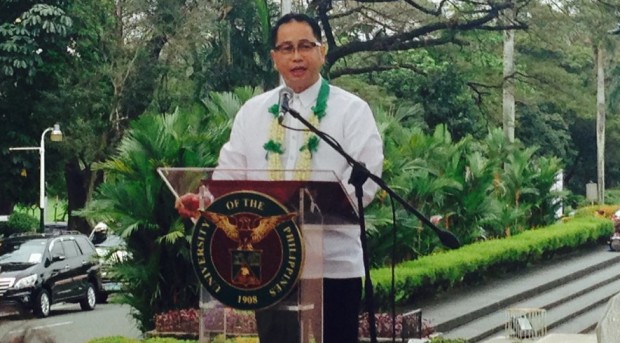UP president: Termination of gov’t pact unwarranted, may lead to mistrust

(File photo) Lawyer Danilo Concepcion delivers his speech as he becomes the 21st University of the Philippines president. PHOTO FROM DZUP’s TWITTER ACCOUNT
MANILA, Philippines — University of the Philippines President Danilo Concepcion has asked Defense Secretary Delfin Lorenzana to reconsider his decision to terminate a long-standing agreement that prohibits any military and police presence inside its campuses.
In a letter addressed to Lorenzana on Tuesday, which was posted on the university’s website, Concepcion expressed “grave concern” on the termination, saying that it was “totally unnecessary” and “unwarranted.”
“[The abrogation] may result in worsening rather than improving relations between our institutions, and detract from our common desire for peace, justice, and freedom in our society,” he wrote.
He also expressed regret that the agreement was terminated unilaterally, without the prior consultation with the university’s officials.
The decision to abrogate the agreement may also result in more confusion and mistrust on the public’s confidence in the police and military, he also pointed out.
Article continues after this advertisement“Instead of instilling confidence in our police and military, your decision can only sow more confusion and mistrust, given that you have not specified what it is that you exactly aim to do or put in place in lieu of the protections and courtesies afforded by the agreement,” Concepcion said.
Article continues after this advertisementThe UP president’s reaction came after the Department of National Defense (DND) has unilaterally terminated a 1989 agreement with UP requiring prior notification to school officials for police and military to enter UP campuses, which signals an intent to deploy, but not post, state security forces for counterinsurgency operations in the state university.
He said the agreement was secured to protect the “climate of the academic freedom,” which is guaranteed by the Constitution.
“We want to maintain UP as a safe haven for all beliefs and forms of democratic expression,” he said.
While the university does not fear the fair and speedy enforcement of the law, and it values the contributions of the country’s uniformed services to safety and security, Concepcion said the university must reject any form or semblance of militarization in its campuses, given its experience of martial law.
“Given our experience of martial law, we must reject any form or semblance of militarization on our campuses, which will have a chilling effect deleterious to academic freedom,” he said.
“This abrogation endangers the goodwill necessary for both of us to achieve our mission as responsible members of the same national family,” he added.
“May I urge you, therefore, to reconsider and revoke your abrogation, and request further that we meet to discuss your concerns in the shared spirit of peace, justice, and the pursuit of excellence,” Concepcion further wrote.
In a letter to Concepcion dated Jan. 15, Lorenzana said the agreement had been a hindrance to operations against communist rebels, especially recruitment of cadres in UP.